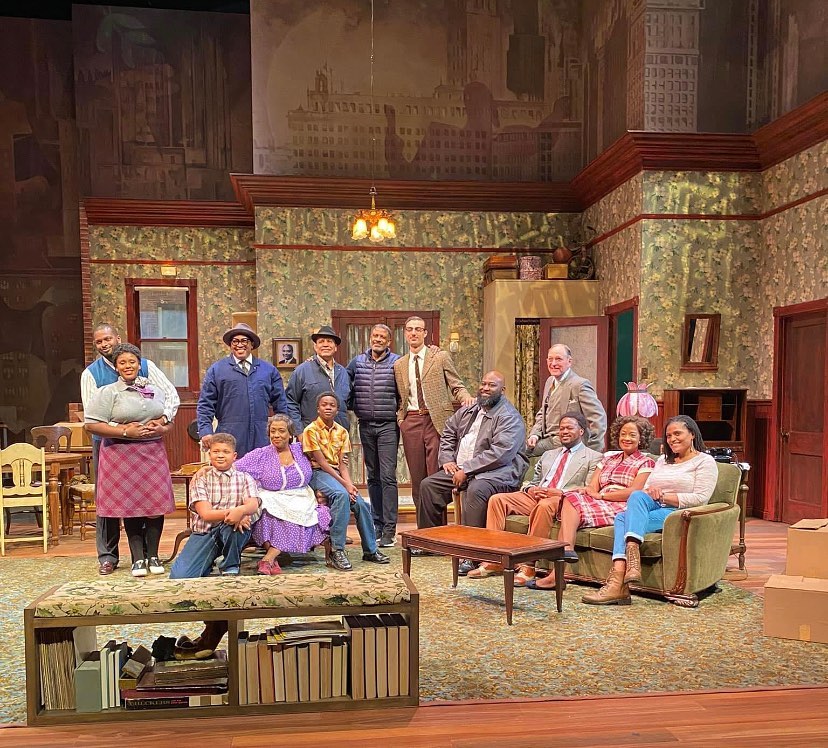By Claire DeMarco
Most people have dreams. Dreams of career success, a lasting relationship, a long life with good health. There are many more possibilities, some more grandiose like fame and fortune, others less so.
In 1950s Chicago Lena Younger (E. Faye Butler) has a dream. She wants to own a home. Currently her nuclear family consisting of her son Walter Lee (Rico Parker), his wife Ruth (Dedra D. Woods), their son Travis (Ty Gilliam) and Lena’s daughter Beneatha (Hope M. Anthony) live in a tiny apartment that has one bathroom and not much privacy for all those residents.
When an important family member dies. Their insurance money enters the equation, and members of the family have very different ideas on how to spend it. They all are expecting an insurance check that could satisfy those dreams. Some wait patiently. Walter is more intent on getting the money quickly and is often asking if the mail came, did the check arrive?
Mama always dreamed of having her own home and one that has a large backyard so she can have a garden. Walter Lee wants the money to invest in a small business. Beneatha knows that part of that money will contribute to her education to pursue a medical degree.
Beneatha’s energy right now is not on the anticipated check. She is befuddled between two suitors who couldn’t be more diametrically opposed. Brenden Peifer (George Murchinson), a college student is intent on a business career and achieving the American dream. Kevis Hillocks (Joseph Asagai), a student from Nigeria is intent on educating Beneatha on her African heritage, an essential part of her persona.
When the check finally arrives a series of events quickly accelerate.
Mama announces that she bought a house in the Clybourne neighborhood, a predominately white area of the city.

Thinking some of the money is out of reach, Walter is distraught but Mama comes through and gives him a small portion of the proceeds with the recommendation that he open his own checking account and deposit money specifically and separately for Beneatha’s tuition.
Ken Bolden (Karl Lindner), a white “welcoming” member from the Clybourne neighborhood association visits the family. Condescendingly he suggests in a sugary voice that perhaps it would be best if the organization buy them out. He thinks it would be best for them. He is asked to leave.
How is the money finally spent and what does Walter do with his share?
Does the family move to Clybourne or back off and stay in their small apartment?
Is the potted plant still in the apartment’s window sill or is it ready to be moved along with the furniture to a new home?
Butler’s performance is brilliant. She captures the essence of a loving, yet stern (when needed) mother. Add in a dash of comedy and common sense that is sometimes overshadowed by despair, she helps guide the family to its final decision.
Parker transitions from a man feeling insecure, mostly impatient and angry with his circumstances to a more rational, emotionally sensible person.
Anthony shines as the younger sibling still child-like at times but whose womanhood and African ancestry evolve and grow.
Hillocks’ passion for Nigeria and his enthusiasm for his future there is captivating.
Woods grows her character from the serious hard-working wife into a hopeful, more joyful and independent person.
Peifer plays the know-it-all college student perfectly.
Bolden portrays the character that one loves to hate and he succeeds.
A beautiful production with a superb cast!
Lonnie the Theater Lady said, “It was an exquisite production. Just beautiful!”
Hats off to Jennifer J. Zeyl for an intricate setting in the Younger apartment and kudos to Director Timothy McCuen Piggee.
-CED
“A Raisin in the Sun” is a production of Pittsburgh Public Theater. It runs from October 12 through October 30. For more information, click here.

